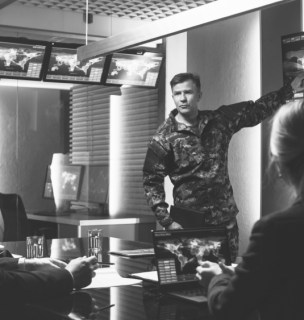
What is a MPA in Geopolitics of Serious Crime?
MPA in Geopolitics of Serious Crime is a specialized level 7 postgraduate program that provides an in-depth knowledge related to the comprehensive mapping of the different types of serious crimes over the world, in addition to the knowledge of the concerned geopolitical issues and challenges.
Due to the transformation of organized crime and the internationalization of criminal organizations, its study is something more than a domestically driven criminal law approach and relies on a global geopolitical approach identifying the link between the crimes and the political dynamics.
The program is taught in English.
What are the reasons to do a MPA Geopolitics of Serious Crime?
Acquire an advanced knowledge on the study of global geopolitical dimension of organized crime such as drug smuggling, human trafficking and money laundering, and to have a better knowledge about the concrete geopolitical dynamic induced by criminal activities.
Courses of the MPA in Geopolitics of Serious Crime
The program is taught in English.
SPECIALIZED COURSES
Criminal Actors
The course focuses on the criminal network, their typology, their motivation, their link with the political actors in a given areas and the national/transnational dimensions.
Criminal Activities
The course presents an analytical typology of the criminal activitie and identify their geographical and geopolitical dynamics.
Among the debated issues: drugs trafficking, Human trafficking, cybercriminality, money laundering, counterfeiting, environmental crimes.
Legal-Illegal Activities and Geographical Areas Topic
Criminal activities are confronted to the two key dimensions – the confrontation with the national legal framework and with international conventions on one hand, and the political geographic mapping that identifies the international flows of activity for each type of crime, on another hand.
Fighting Serious Crimes
This course mobilizes resources related to the legislative reforms to fight criminal actions and organizations, in addition to the practical actions taken by the police forces and by the interstate security cooperation frameworks.
FUNDAMENTAL WORKSHOPS
Workshop in Geopolitics
The purposes of the workshop are summarized as follows :
Enabling the student to exploit and use the knowledge provided in the fundamental courses in geopolitics and geostrategy
Developing the methodological skills in geopolitics, through a better knowledge of the method of analysis related to the geopolitical issues
Applying the concepts and doctrine to specific areas of conflicts and crises adapted to the concerns of the students.
Developing a synthetic approach and a critical thinking through the research papers and presentations required
Workshop in Research Methodology
The workshop is dedicated to the scientific research processes in the social sciences, in international relations, diplomacy, geostrategy and geopolitics. It presents the methods used in the development of hypotheses and in the use of information or observation data. It specifically addresses the method of writing the dissertation itself.
FUNDAMENTAL COURSES
Geopolitics of the developing world : the case of Africa
This is a pluridisciplinary course combining the development related economic problematics with the geopolitical approach of the developing countries’ position inside the global system.
The course focuses on the African continent and spells its diversity in economic as well as in political terms. It is mainly dedicated to paradoxes: the paradox of a rising continent that is still the target of the planetary and regional powers’ ambitions, the coexistence, in a similar sub-region of countries with a solid economic growth and of devastated countries, as well as many others. The integrative dimension through the African Union and the subregional organizations is also worth to be studied.
Geopolitics and Geostrategy of the Great Powers
The very nature of an international/or/global political system relies on the balance of force between the leading global powers. As the world system moved from a bipolar system to a unipolar, then to the present system qualified a multipolar by some and as non-polar by others, the course emphasizes a presentation of:
- the capabilities of each of the great powers, in addition to the political structure and dynamics
- the foreign policies in their changing doctrines and strategies for each of the considered powers
- their influence on the global geostrategic landscape
Geopolitics of the Sea and Maritime Strategies
The control of the sea seems to be one of the key issues as far as the national economies are dependent on foreign trade and shipments of commodities and manufactured goods, on international movements of population and on the access to strategic locations.
The course combines a historical approach starting with the development of political geography and the emergence of sear powers, with an updated presentation of the key present issues at stake, stressing out the type of control exerted by each of the planetary and regional powers.
Each of those powers has its own maritime strategy to control the key location in the seas, oceans, and straights, or at least to balance the expansion and the hegemonic strategy of competing or antagonistic powers.
The objectives of the MPA in Geopolitics of Serious Crime

To allow students to conduct a concrete study of the geopolitics of criminal activities, networks and responses to global crime

To enable diplomats from developing countries to better master the practices and theories of diplomatic action
The course of the year for the MPA in Geopolitics of Serious Crime
The program runs for one year. The courses are adapted to the professional constraints of executives in terms of time volume and schedule.
The courses are scheduled on a weekly basis for four months, giving priority to two afternoons (Thursday and Friday, 3:30-8:30 p.m.) as much as possible, and spreading some courses over three intensive weeks.
The next intake is expected for late November 2024


The research thesis of a MPA in Geopolitics of Serious Crime
The auditor completes the program with the writing and defense of a thesis of at least 50 pages under the supervision of a CEDS professor. The research paper represents the essential step in the training, insofar as it allows the student to delve deeper into a theme related to criminal activities, structures, mapping or to the repressive side or any other related issue of the student’s choice.
Prerequisites to apply for the MPA in Geopolitics of Serious Crime
A Master’s level degree is required, as well as four years of professional experience as a senior manager.


Access requirements for the MPA in Geopolitics of Serious Crime
To enter the program, the auditor must complete an application.
Skills and opportunities offered by a MPA curriculum in Geopolitics of Serious Crime
- Develop the expertise in studying and mapping organized crime and to display an ability to mobilize advanced knowledge and skills in exploiting the theories and concepts to understand the appropriate cases studies.
- Contribute to the research centers and foundations dedicated to the study of criminal activities and networks.
- Support the governments’ security policies by providing an appropriate understanding of the criminal geopolitical landscape.

Tuition fees for the MPA in Geopolitics of Serious Crime
| Nationals and residents | International candidates |
|---|---|
| 10400€ | 10890€ |
Practical information about the MPA in Geopolitics of Serious Crime
Success rate
The success rate is still unkown

Stakeholders
All our speakers are lecturers or experts in their field.

Campus
Classes are held at :
10 Sextius Michel
75015 Paris
France

Accessibility
The premises are accessible to people with reduced mobility.
Our programs can be followed in person or by videoconference, at the choice of the listener.

Last update on







